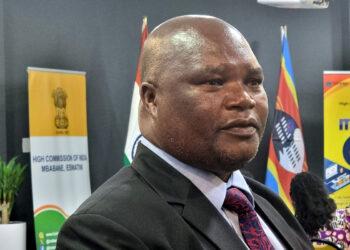Tanzania’s largest city, Dar es Salaam, was gripped by fresh protests on Wednesday as police fired gunshots and teargas to disperse crowds angered by a controversial general election that opposition groups say was neither free nor fair.
Witnesses reported that demonstrators clashed with police in several parts of the city, including Mbagala, Gongo la Mboto and Kiluvya, after unrest broke out during Wednesday’s vote. The protests were triggered by the disqualification of President Samia Suluhu Hassan’s two main challengers from the presidential race, leaving only minor parties to contest against the ruling Chama Cha Mapinduzi (CCM).
Authorities responded by imposing an overnight curfew in Dar es Salaam, a city of more than seven million people. Tanzania’s police chief, Camelius Wambura, announced that the curfew would begin at 6 p.m. local time, urging residents to stay indoors. He did not indicate when the restrictions would be lifted. The regional commissioner, Alfred Chalamila, warned that the government would act firmly against those “disrupting peace.”
The unrest, which included the burning of a government office, is seen as a key test for President Hassan, who came into office in 2021 as Tanzania’s first female head of state following the death of John Magufuli. Although initially celebrated for easing political repression, her administration is now accused by opposition figures and human rights groups of tightening control and targeting critics through arrests, abductions, and intimidation.

The U.S. Embassy issued an alert, warning citizens to avoid certain areas of the city, including the main road leading to Julius Nyerere International Airport, which was closed by authorities. Reports also showed that protesters were using the Zello mobile app to coordinate future marches targeting government buildings.
Government spokesperson Gerson Msigwa announced on Instagram that all civil servants should work from home, except those performing essential duties. The state broadcaster also instructed students to stay home as a precaution.
The country’s main opposition party, CHADEMA, had earlier called for demonstrations during the election, describing it as a “coronation” of President Hassan. The party was barred from contesting the polls in April after refusing to sign an electoral code of conduct, and its leader, Tundu Lissu, was charged with treason. The ACT-Wazalendo party’s candidate, Luhaga Mpina, was also disqualified on legal grounds.
Amnesty International and other rights groups condemned what they called a “wave of terror” ahead of the election, citing forced disappearances, torture, and killings of opposition members. The government dismissed the allegations and insisted the vote was free and fair.
Reports from the southwestern city of Mbeya and the border town of Tunduma indicated that similar demonstrations were spreading. “We are tired. We want an independent electoral commission so that every Tanzanian can choose the leader they want,” one protester told the BBC.
Meanwhile, internet connectivity across the country has been severely disrupted. Global internet monitor NetBlocks described the situation as a “nationwide digital blackout.”
Election officials say more than 37 million registered voters were eligible to participate in the presidential and parliamentary elections, but turnout in Dar es Salaam was low amid fears of violence and police crackdowns.











Discussion about this post